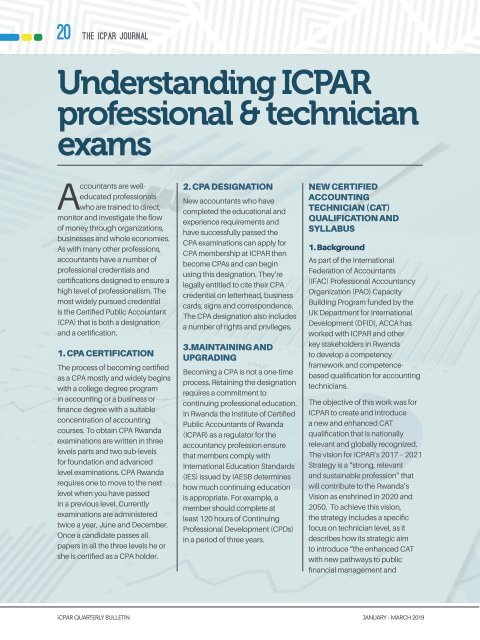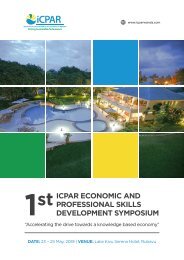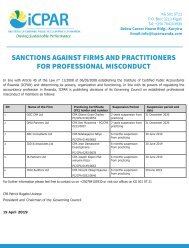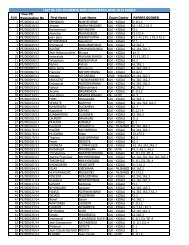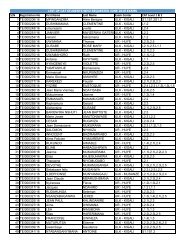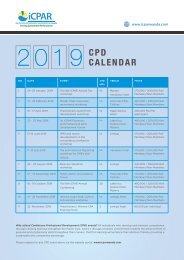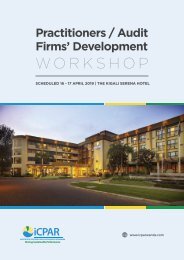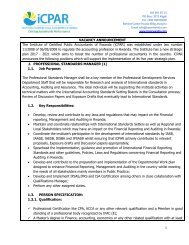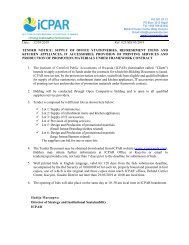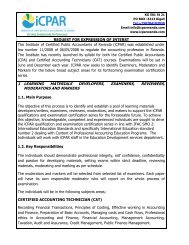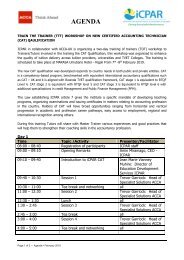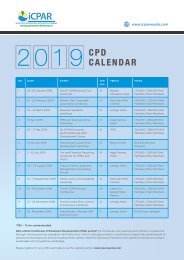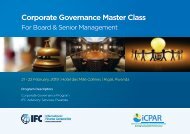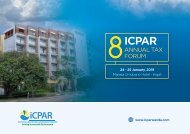iCPARQuarterlyBulletin-March2019
You also want an ePaper? Increase the reach of your titles
YUMPU automatically turns print PDFs into web optimized ePapers that Google loves.
20 THE iCPAR JOURNAL<br />
Understanding ICPAR<br />
professional & technician<br />
exams<br />
Accountants are welleducated<br />
professionals<br />
who are trained to direct,<br />
monitor and investigate the flow<br />
of money through organizations,<br />
businesses and whole economies.<br />
As with many other professions,<br />
accountants have a number of<br />
professional credentials and<br />
certifications designed to ensure a<br />
high level of professionalism. The<br />
most widely pursued credential<br />
is the Certified Public Accountant<br />
(CPA) that is both a designation<br />
and a certification.<br />
1. CPA CERTIFICATION<br />
The process of becoming certified<br />
as a CPA mostly and widely begins<br />
with a college degree program<br />
in accounting or a business or<br />
finance degree with a suitable<br />
concentration of accounting<br />
courses. To obtain CPA Rwanda<br />
examinations are written in three<br />
levels parts and two sub-levels<br />
for foundation and advanced<br />
level examinations. CPA Rwanda<br />
requires one to move to the next<br />
level when you have passed<br />
in a previous level. Currently<br />
examinations are administered<br />
twice a year, June and December.<br />
Once a candidate passes all<br />
papers in all the three levels he or<br />
she is certified as a CPA holder.<br />
2. CPA DESIGNATION<br />
New accountants who have<br />
completed the educational and<br />
experience requirements and<br />
have successfully passed the<br />
CPA examinations can apply for<br />
CPA membership at ICPAR then<br />
become CPAs and can begin<br />
using this designation. They’re<br />
legally entitled to cite their CPA<br />
credential on letterhead, business<br />
cards, signs and correspondence.<br />
The CPA designation also includes<br />
a number of rights and privileges.<br />
3.MAINTAINING AND<br />
UPGRADING<br />
Becoming a CPA is not a one-time<br />
process. Retaining the designation<br />
requires a commitment to<br />
continuing professional education.<br />
In Rwanda the Institute of Certified<br />
Public Accountants of Rwanda<br />
(ICPAR) as a regulator for the<br />
accountancy profession ensure<br />
that members comply with<br />
International Education Standards<br />
(IES) issued by IAESB determines<br />
how much continuing education<br />
is appropriate. For example, a<br />
member should complete at<br />
least 120 hours of Continuing<br />
Professional Development (CPDs)<br />
in a period of three years.<br />
NEW CERTIFIED<br />
ACCOUNTING<br />
TECHNICIAN (CAT)<br />
QUALIFICATION AND<br />
SYLLABUS<br />
1. Background<br />
As part of the International<br />
Federation of Accountants<br />
(IFAC) Professional Accountancy<br />
Organization (PAO) Capacity<br />
Building Program funded by the<br />
UK Department for International<br />
Development (DFID), ACCA has<br />
worked with ICPAR and other<br />
key stakeholders in Rwanda<br />
to develop a competency<br />
framework and competencebased<br />
qualification for accounting<br />
technicians.<br />
The objective of this work was for<br />
ICPAR to create and introduce<br />
a new and enhanced CAT<br />
qualification that is nationally<br />
relevant and globally recognized.<br />
The vision for ICPAR’s 2017 – 2021<br />
Strategy is a “strong, relevant<br />
and sustainable profession” that<br />
will contribute to the Rwanda’s<br />
Vision as enshrined in 2020 and<br />
2050. To achieve this vision,<br />
the strategy includes a specific<br />
focus on technician level, as it<br />
describes how its strategic aim<br />
to introduce “the enhanced CAT<br />
with new pathways to public<br />
financial management and<br />
iCPAR QUARTERLY BULLETIN<br />
JANUARY - MARCH 2019


